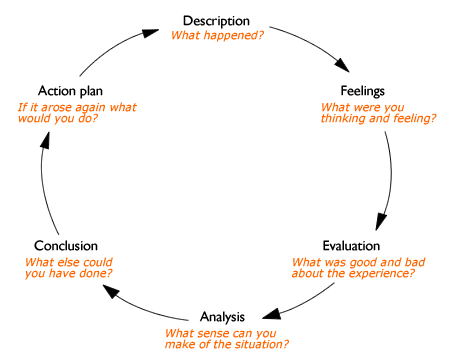
The Gibbs Reflection Cycle has proven to be an effective tool for more than 20 years. It was designed to help those who want to better evaluate the relationship between thoughts, feelings and actions. It invites you to look at what has happened in stages. Far too often, because we are overwhelmed by an experience, we do not properly evaluate what has taken place. The ‘blur’ of the experience disempowers us in such a way that we’re not able to see our patterns and understand the influences that have shaped our responses. You may find this a useful model to help you make sense of the way you react and respond to situations.
One of the most helpful aspects of this reflective cycle is that it helps the individual understand that context is critical in the evaluation of any experience. In fact, if we don’t take the context into account, the meaning we can derive from our experiences is completely distorted and any potential learning diminished. You will find this a more useful exercise to undertake in a written format or in discussion with another supportive party.
1. Context/Description
What has happened?
Briefly describe the event as objectively, accurately and concisely as you can.
Who was involved?
Where did it happen?
2. Thoughts/Feelings
What were your thoughts…
…at the time?
…afterwards?
What were your feelings or emotions, both positive and negative…
…at the time ?
…afterwards ?
3. Evaluation
How well did things go?
Were things satisfactorily resolved?
4. Analyse
What were the factors that affected the outcome?
What helped and what hindered?
Can you explain the event?
Why did it happen?
How did it happen?
5. Conclusion/Reframe
What might have been some alternative actions or approaches?
What might you have done differently (even when things went well)?
Could negative events be avoided?
Could positive events be made more effective?
6. Future action
What will you do if you encounter this kind of situation again?
What will you do in the future to increase the likelihood of similar positive outcomes and minimise the likelihood of similar negative outcomes?
What do you need to learn?
How might you learn this?
Also see: Mindfulness- Prof. Mark Williams and Mind Maps
